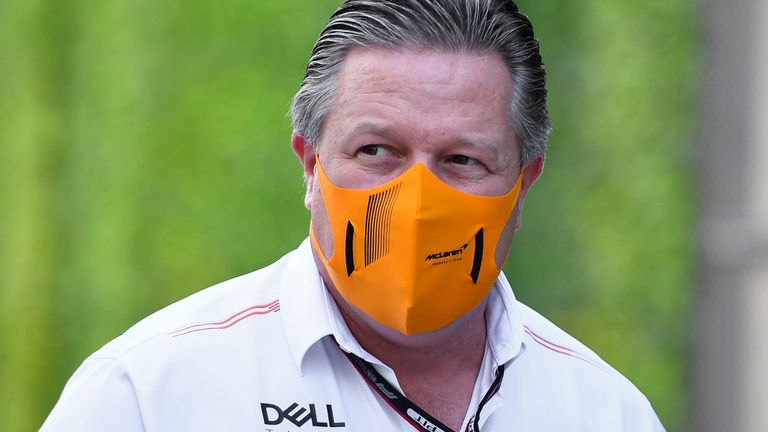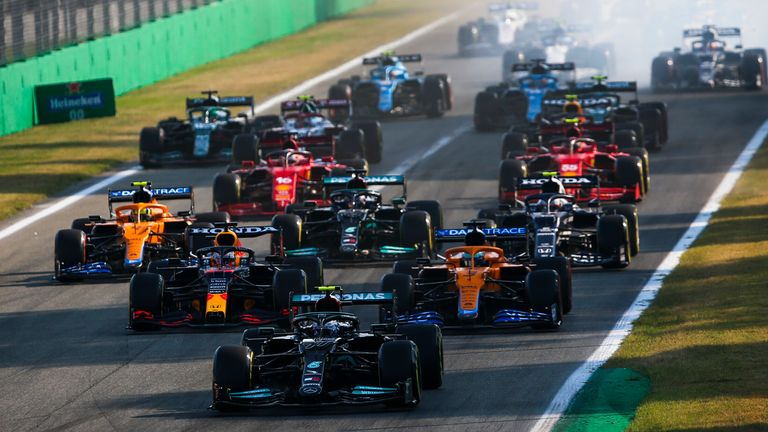F1 in 2022: McLaren’s Zak Brown says Abu Dhabi GP controversy ‘symptom’ of wider rulemaking issues
Zak Brown: “It is clear that some of the rules and their governance are not acceptable as things stand. No one is happy with the inconsistency in the policing of the regulations, but which has been habitually exploited by teams for competitive advantage”
By James Galloway
Last Updated: 17/01/22 7:39pm

McLaren chief executive Zak Brown believes Formula 1 teams “have too much power and it needs to be reduced” as he described the controversial Abu Dhabi GP as a “symptom rather than cause” of issues with rulemaking and governance.
Although he did not name any rival outfits directly, Brown claimed “at times it has seemed the sport is governed by certain teams”, while he also likened the lobbying from team management to Race Control over the radio during races as a “pantomime audition”.
In a wide-ranging column on McLaren’s website looking ahead to 2022 for both the Woking outfit and the sport as a whole, the American team chief expressed strong views on several key topics in F1 – especially around the formation of regulations.
Brown said he hoped the recent election of new FIA president Mohammed Ben Sulayem “provides the opportunity for collective reform of the way Formula 1 operates”.
The FIA is currently holding an inquiry into the events of last month’s 2021 season finale.
“It is obvious to focus on the events of Abu Dhabi at the end of last season, which are the subject of an FIA investigation, but this was a symptom rather than cause in my view,” wrote Brown, McLaren’s CEO.
“There have been systemic issues around alignment and clarity on who makes the rules – the FIA or the teams – that have manifested themselves in the past couple of years, at times in a high-profile way.
“The signs of organisational difficulties could be seen at the 2020 Australian Grand Prix and at last year’s Belgian Grand Prix, both hallmarked by a seeming lack of preparation for the events unfolding and temporary inertia on the solutions.
“Greater clarity on the roles of the FIA and F1 and the need for increased leadership of the sport will undoubtedly be on the agenda for Mohammed Ben Sulayem and Stefano Domenicali and their respective teams.
“Previous administrations pursued a mainly autocratic style of governance, so to point the sport in the right direction it was necessary to take a more consultative approach with teams and stakeholders. But now the sport has been successfully reset, moving forward there is a need to shift back to stronger, more directive leadership and governance at the top of the sport.”
Brown added: “It is clear that some of the rules and their governance are not acceptable as things stand. No one is happy with the inconsistency in the policing of the regulations, but which has been habitually exploited by teams for competitive advantage.
“I have said before that the teams have too much power and it needs to be reduced. We have a significant role in the drafting of the regulations and governance of Formula 1 and that influence is not always driven by what is best overall for the sport.”
While he agrees that teams should be consulted on regulations and long-term vision, he believes they have “contributed to the inconsistencies in the policing of the regulations as much as anyone” in recent years.
“It is the teams who applied the pressure to avoid finishing races under a Safety Car at all costs,” he added.
“It is the teams who voted for many of the regulations they have complained about. It is the teams who have been using the broadcasting of radio messages to the race director to try to influence penalties and race outcomes, to the point where an over-excited team principal plays to the gallery and pressurises race officials. This has not been edifying for F1. At times it’s felt like a pantomime audition rather than the pinnacle of a global sport.”

F1 staged three sprint races in 2021 – at Silverstone, Monza and Interlagos – with around six expected in the new season
Brown also took aim at rivals over what he believes are attempts to use the expected addition of more sprint races to increase the budget cap – which is $140m for 2022 – while he also expressed fresh concern over so-called ‘B’ teams on the grid.
“The current governance structure of the sport enables a situation where some teams, to protect their own competitive advantage, are effectively holding the sport hostage from what’s best for the fans and therefore the sport at large,” he said.
“These teams seem unable to accept that a budget cap is in the best interests of the sport and cannot kick their habit of spending their way to the front.”
Brown has ‘even more optimism’ for F1’s future as new era begins

Although keen to see significant change in the way the sport is governed through the rulebook, Brown believes F1 as a whole is in a good place to enter the revolutionary new era of rules for this season.
He said McLaren’s own “clear aim” is “to build on the foundations of our recent progress” after finishing fourth, third and fourth in the last three seasons, and ending their nine-year victory drought in 2021.
“There are several reasons to be excited for F1 in 2022,” he added.
“The new technical regulations present one of the biggest resets the sport has seen. Not only will the revisions increase the unpredictability of the competitive order as we head to the first round in Bahrain, but the changes to the cars (with an emphasis on ground-effect aerodynamics) should enrich the on-track spectacle for the fans.
“The impressive growth of F1 in recent years, particularly in the past two seasons in the face of a global pandemic, speaks volumes to the leadership and determination of F1 CEO Stefano Domenicali and his predecessor, and now chairman, Chase Carey and their team. Delivering a record calendar in 2021 and the increase in viewership and the global fanbase is good news for the whole sport and fills me with even more optimism for the future.”


Pingback: https://stealthex.io
Pingback: Science
Pingback: go to these guys